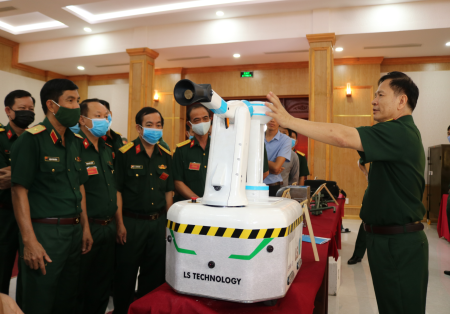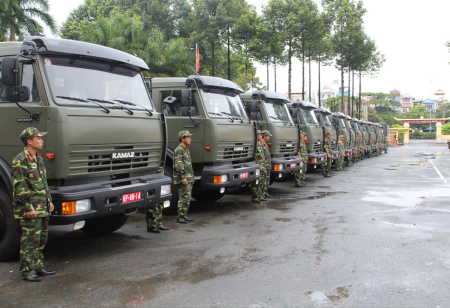Promoting learning and following Uncle Ho in the logistics sector of Military Region 7
Embracing the teachings of President Ho Chi Minh, “Provision work is as important as directly fighting the enemy on the battlefields. Providing sufficient weapons and supplies for the soldiers is what leads to victory in battles,” the logistics sector of Military Region 7 has strived to fulfil its functions and duties to contribute to enhancing the overall quality and combat power of the Military Region’s armed forces.
In recent years, influenced by various factors, especially the negative impact of the Covid-19 pandemic, the socio-economic situation in some areas within Military Region 7 has faced considerable difficulties. Meanwhile, the constrained defence and local budgets, insufficient well-trained basic logistics personnel, and outdated logistics infrastructure and equipment are posing challenges to the Military Region’s logistical assurance. Despite these challenges, the Military Region 7’s logistics sector has deeply implemented the superiors’ resolutions and directives on logistics work, promoted the spirit of “self-reliance, self-strengthening, proactiveness, and creativity,” and closely coordinated with various levels, sectors, localities, and forces in comprehensively and effectively carrying out logistical work, bringing about positive changes. Logistical assurance methods have been innovated effectively; meanwhile, logistical assurance for tasks, especially urgent ones, has been deployed systematically, promptly, and robustly. Logistic reserves are organised rigorously, scientifically, and deeply. Regular logistical assurance has been increasingly standardised and disciplined in association with elevated troop care quality, improved soldier healthcare, and well-regulated and aesthetically pleasing military bases. The management and utilisation of material facilities and technical equipment have been implemented to ensure safety and efficiency. Especially, during the Covid-19 pandemic, alongside the entire Party, people, and Army, the Military Region 7’s logistics sector has played a pivotal, proactive, and creative role, achieving remarkable results and contributing significantly to protecting the lives and health of the people, stabilising the local situation, and bringing the country into a new normal state. The results are attributed to various factors, with a strong emphasis on promoting learning and following Uncle Ho’s teachings to the Military Logistics, which serve as a crucial spiritual driving force.
 |
| Leaders of MR7 visit technological innovation of the Eastern Military-Civilian Hospital |
In implementing Uncle Ho’s guidance that “If there is enough food supply, the army will be strong”, the logistics sector has concentrated on effective breakthroughs in military supply to gradually improve the lives of the troops. The Logistics Department Party Committee and Board of Commanders have closely adhered to practicalities, conducted research, provided counsel, and proposed numerous strategies and measures to the Military Region Party Committee and High Command. This aims to innovate and enhance the quality and efficiency of this vital task, closely associated with promoting the movement of “Excellently nurturing soldiers, efficiently managing military supplies”, based on emphasising the responsibility and dedication of logistics personnel at all levels. The sector has emphasised on promoting creativity, improving food processing, and excelling in hygiene and food safety; innovated and installed equipment to efficiently support soldier nutrition, such as the installation and safe operation of mechanical steam kitchens, oil and gas stoves, and electric stoves following the guidelines of the Logistics General Department, contributing to significantly lowering food cost from 20% to 25%; proactively provided adequate and timely uniforms for cadres, employees, and soldiers, especially for young conscripts in various communes, wards, and towns before their enlistment; and directed units and localities to utilise available land to organise production to generate locally sourced, high-quality food, enhancing the troops’ lives based on the criteria of “good food, nice uniforms, warm sleep, and clean water”. The sector has also collaborated with the High-Tech Agricultural Management Board of Ho Chi Minh City and the agriculture and rural development departments of provinces and cities to effectively implement the “Developing farming, production, and livestock breeding” project with an investment exceeding 60 billion VND; organised training sessions, implemented high-tech agricultural cultivation techniques, and applied techniques for production, farming, and disease prevention for logistics personnel in various agencies and units; and built and multiplied new, effective models for farming, production, and livestock breeding, making the production activities of units and localities sustainable. This reflects the commitment of the logistics sector to improve the quality of life and well-being of the armed forces in accordance with Uncle Ho’s teachings.
Successfully implementing the “Five-good military medical unit” movement is a practical application of learning and following Uncle Ho’s teachings: “A good doctor must also be a kind mother, wholeheartedly and with utmost effort to treat and serve wounded and sick soldiers, actively improving the health of the troops”. In line with this, the Logistics Department Party Committee and Board of Commanders have enhanced guidance for military hospitals, medical facilities, and military-civilian medical stations to effectively carry out health care measures for both the military and the civilian population. Health examinations and health improvement programmes for new conscripts and soldiers have been conducted innovatively, rigorously, and with a focus on quality. In the implementation process, importance has been attached to the effective implementation of Project “Developing the military-civilian medical network to ensure combat readiness and defence capabilities of the armed forces in the Military Region” project and the “Developing three Military Region hospitals” and collaboration and coordination with health departments, hospitals, and research centres in the region to organise training courses and conferences for the continuous improvement of medical skills and capabilities for doctors and nursing staff. In collaboration with local healthcare in the defence area, military medical forces have proactively organised health examinations, medical treatments, and provision of free medication to the civilians, especially in remote areas, revolutionary bases, border areas, and islands (Phu Quy and Con Dao). To meet the increasing demands of healthcare for cadres, soldiers, and the civilians, the sector has proposed the establishment of 15 military-civilian medical stations with a total capital of over 60 billion VND from local budgets combined with the Military Region’s. Simultaneously, investments have been made to upgrade infrastructure and equipment for hospitals and medical stations, contributing to relieving the burden on higher-tier hospitals and addressing pressing healthcare issues in the region. Besides, it has also sent medical personnel to the Navy in safeguarding sovereignty over seas and islands; provided training for medical assistants at border guard posts; and participated in the Level 2 field hospital in South Sudan. The healthy soldier rate of the entire Military Region has consistently exceeded targets (averaging 99.4% per year), contributing to the overall quality and combat power of the armed forces in the Military Region and its subordinate units.
 |
| Combat readiness training at Regiment 657 |
In deep understanding of President Ho Chi Minh’s words “Vehicles and fuel are the sweat, tears, and blood of the people. You must take care of vehicles like your own children, and cherish fuel like blood”, in recent years, the Logistics Department of Military Region 7 has overcome difficulties to ensure an adequate and timely supply of fuel and transportation for the armed forces to successfully accomplish all tasks. In fuel management, it has focused on closely monitoring and forecasting market conditions to build stable fuel sources, meeting timely demands for missions and ensuring suitable reserves for combat readiness; strictly implementing plans for distribution and decentralisation of management and usage of fuel alongside practices of economy, anti-loss, and prevention of waste; and planning and investing in consolidating, upgrading, and building new storage facilities, ports, pipelines for fuel reception, storage, and preservation. The sector has advocated for the Military Region to invest in upgrading fire prevention and lightning protection systems to ensure absolute safety for warehouses and stations, without incidents of fire and explosions. To enhance the defence capabilities of the Military Region, the sector has concentrated on implementing the “Planning and developing a fuel network combined with defence and economic activities of the armed forces in Military Region 7” project. To date, it has proposed the construction and operation of 15 fuel stations combined with defence and economic activities, with a total investment of 45 billion VND to form a solid and deep network of fuel supply, efficiently exploiting local fuel sources and timely ensuring fuel for national defence and security missions. Regarding transportation, the sector has proactively innovated transportation methods, focusing on reasonable decentralisation and socialisation of transportation for regular and urgent tasks; paid attention to ensuring safety in transportation and traffic safety; prioritised the best budget allocation for support of vehicles for combat readiness tasks, mobilisation for foreign missions, disaster relief, and search and rescue operations. The implementation of the Project “Ensuring transportation for combat readiness and defence capabilities of the armed forces in Military Region 7 in the 2017-2020 period and beyond” has been closely linked with promoting the movement of building “Standard, safe, and efficient fuel depots” and “Regular, safe, and efficient transportation units”. Thanks to these efforts, fuel has been maximally saved, storage facilities and transportation vehicles have been ensured with absolute safety, and costs for repairs and maintenance have been minimised, contributing to ensuring the success of assigned missions for agencies and units throughout the Military Region.
Along with the aforementioned solutions, the Logistics sector has consistently focused on providing well-considered recommendations for the leadership of the Military Region, directing and innovating the barrack work. In this context, the effective implementation of the movement “Constructing and managing standardised, green, clean, and beautiful barracks” has been a focal point with six specific contents. Applying the principle of “from the top down, everyone participates,” various agencies and units have actively invested with savings from farming and production in constructing, repairing, and upgrading barracks, training grounds, warehouses, logistics stations, and headquarters. The sector has taken the initiative to advise the Military Region to coordinate with localities in investing billions of dong in ensuring barrack facilities, constructing welfare houses, and social housing for cadres, soldiers, etc. As a result, the appearance of each agency and unit in the entire Military Region has undergone fundamental and comprehensive changes. The barrack system has become more standardised, orderly, green, clean, and beautiful, contributing to the establishment of a cultural environment within the Military and providing the soldiers with reassurance in successfully fulfiling the assigned tasks.
These results serve as a solid foundation for the Logistics sector to further intensify learning and follow the teachings of Uncle Ho, contributing to enhancing the overall quality and combat power of the armed forces of Military Region 7, ensuring the successful accomplishment of military and defence tasks.
Senior Colonel NGUYEN THANH TAM, Head of the Logistics Department, Military Region 7